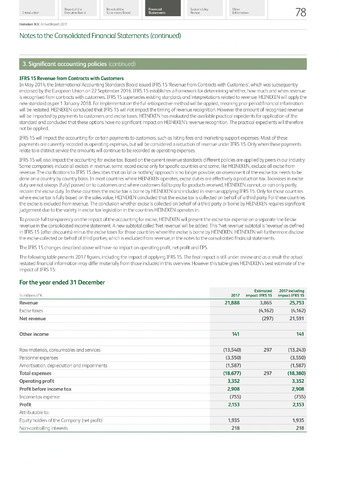78
Notes to the Consolidated Financial Statements (continued)
3. Significant accounting policies (continued)
For the year ended 31 December
Report of the
Report of the
Financial
Sustainability
Other
Introduction
Executive Board
Supervisory Board
Statements
Review
Information
Heineken N.V. Annual Report 2017
IFRS15 Revenue from Contracts with Customers
In May 2014, the International Accounting Standards Board issued IFRS 15 'Revenue from Contracts with Customers', which was subsequently
endorsed by the European Union on 22 September 2016. IFRS 15 establishes a framework for determining whether, how much and when revenue
is recognised from contracts with customers. IFRS 15 supersedes existing standards and interpretations related to revenue. HEINEKEN will apply the
new standard as per 1 January 2018. For implementation the full retrospective method will be applied, meaning prior period financial information
will be restated. HEINEKEN concluded that IFRS 15 will not impact the timing of revenue recognition. Howeverthe amount of recognised revenue
will be impacted by payments to customers and excise taxes. HEINEKEN has evaluated the available practical expedients for application of the
standard and concluded that these options have no significant impact on HEINEKEN's revenue recognition. The practical expedients will therefore
not be applied.
IFRS 15 will impact the accounting for certain payments to customers, such as listing fees and marketing support expenses. Most of these
payments are currently recorded as operating expenses, but will be considered a reduction of revenue under IFRS 15. Only when these payments
relate to a distinct service the amounts will continue to be recorded as operating expenses.
IFRS 15 will also impact the accounting for excise tax. Based on the current revenue standards different policies are applied by peers in our industry.
Some companies include all excises in revenue, some record excise only for specific countries and some, like HEINEKEN, exclude all excise from
revenue. The clarifications to IFRS 15 describes that an all or nothing' approach is no longer possible; an assessment of the excise tax needs to be
done on a country by country basis. In most countries where HEINEKEN operates, excise duties are effectively a production tax. Increases in excise
duty are not always (fully) passed on to customers and where customers fail to pay for products received, HEINEKEN cannot, or can only partly
reclaim the excise duty In these countries the excise tax is borne by HEINEKEN and included in revenue applying IFRS 15. Only for those countries
where excise tax is fully based on the sales value, HEINEKEN concluded that the excise tax is collected on behalf of a third party For these countries
the excise is excluded from revenue. The conclusion whether excise is collected on behalf of a third party or borne by HEINEKEN requires significant
judgement due to the variety in excise tax legislation in the countries HEINEKEN operates in.
To provide full transparency on the impact of the accounting for excise, HEINEKEN will present the excise tax expense on a separate line below
revenue in the consolidated income statement. A new subtotal called 'Net revenue' will be added. This 'Net revenue' subtotal is 'revenue' as defined
in IFRS 15 (after discounts) minus the excise taxes for those countries where the excise is borne by HEINEKEN. HEINEKEN will furthermore disclose
the excise collected on behalf of third parties, which is excluded from revenue, in the notes to the consolidated financial statements.
The IFRS 15 changes described above will have no impact on operating profit, net profit and EPS.
The following table presents 2017 figures, including the impact of applying IFRS 15. The final impact is still under review and as a result the actual
restated financial information may differ materially from those included in this overview. However this table gives HEINEKEN's best estimate of the
impact of IFRS 15:
In millionsof€
2017
Estimated
impact IFRS 15
2017 including
impact IFRS 15
Revenue
21,888
3,865
25,753
Excise taxes
(4,162)
(4,162)
Net revenue
(297)
21,591
Other income
141
141
Raw materials, consumables and services
(13,540)
297
(13,243)
Personnel expenses
(3,550)
(3,550)
Amortisation, depreciation and impairments
(1,587)
(1,587)
Total expenses
(18,677)
297
(18,380)
Operating profit
3,352
3,352
Profit before income tax
2,908
2,908
Income tax expense
(755)
(755)
Profit
2,153
2,153
Attributable to:
Equity holders of the Company (net profit)
1,935
1,935
Non-controlling interests
218
218

